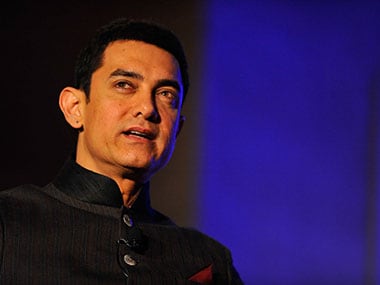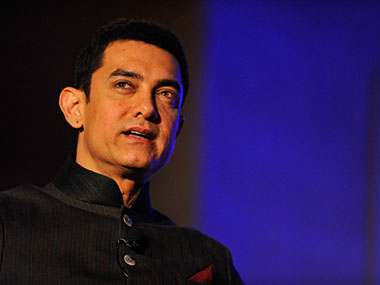How does one show dissent in a democracy? Noted Indologist Wendy Doniger, whose work Hindus: An Alternative History was pulped by a publisher of international repute when faced with a lawsuit, reckons that returning of awards by writers and filmmakers is a legitimate form of protest in a democracy and that it can be really effective. Her views are echoed by Pritish Nandy, politician, film producer, writer and artist who, in a recent blog for The Times of India, explains that creative individuals who return their awards, do so because they have no other way of voicing their discontent. [caption id=“attachment_2522746” align=“alignleft” width=“380”]  Aamir Khan. Getty Images[/caption] Nandy goes on to say: “Most of the people I know (including Jayanta Mahapatra who he describes at length as a non-partisan poet) who are returning their awards are doing so because they know no other way to voice their anguish at the current scenario… Those who are returning their awards are sad, disappointed people. And they are sadder because their motives are being misconstrued.” Doniger s ees this is as an indication “that the great Indian tradition of debate is alive and well.” It is widely accepted that authors, filmmakers, historians, scientists and men of repute who have been at various times honoured by the state for excellence in their fields, may use their awards as a tool of protest when they are anguished about an issue or a discourse. Their gesture may rightly be construed as freedom of expression. Their dissent is an invaluable part of the checks and balances of a robust democracy. It also proves why democracy is a far superior system of governance. Now let’s ask ourselves, if the return of an award by a writer is freedom of expression, why should uninstalling of an app by a consumer be any less? The autorickshaw driver, insurance agent, student, homemaker, office goer or a small business owner may not have an award to return but they have every right to take recourse to a peaceful and legitimate form of protest to lodge their displeasure. Or is the anguish of a common man less important than the angst of a writer or a scientist? It is perverted logic to differentiate between dissents and term ‘award-wapsi’ as ’legitimate non-conformism’ and ‘app-wapsi’ as ‘commercial bullying’ when the mode of protest is voluntary and involves no coercion or threat of physical harm. The millions who thronged at Aamir Khan’s movies and cheered for him, may have not found resonance with his views of an ‘intolerant’ India. Their action to disassociate themselves from Snapdeal, the brand which Khan champions, is every bit an extension of the freedom of expression that is the lifeblood of a democracy. Till the writing of this report, over 91,000 consumers have, in the past two days, downgraded the Snapdeal app to one on a scale of five in App Store and Playstore and there are reports that close to 7,00,000 have uninstalled the app from their mobile phones. Aamir, a genuine A-lister and one of Bollywood’s highest-paid actors, have in the past endorsed a plethora of brands including Coca Cola, Titan, Tata Sky, Godrej and Samsung, just to name a few. While Snapdeal has issued a statement distancing itself from the actor’s remark saying the comments made by Aamir were “in his personal capacity”, Godrej hastened to add that Aamir is no longer associated with them. It is evident that brands are feeling the heat, as is the norm in a free market economy where customers worldwide voice their dissent by peaceful consumer boycott whenever a brand ambassador lands in a controversy. When you associate your brand (in this case, Snapdeal) with a celebrity (here, Aamir), you buy into his charisma, marketability and worldview. If a company wants to leverage his stardom, it must also share his negative publicity. From Lance Armstrong, Tiger Woods, Kobe Bryant, Michael Phelps, Wayne Rooney, Mike Tyson to Chris Brown, Madonna or Kate Moss, brand endorsement agreements worldwide are littered with instances where companies have dropped ambassadors like hot potatoes when faced with consumer boycott. Why, Nike, weighed in on FIFA to get rid of Sepp Blatter, something that nobody could do for decades. It is downright silly to suggest that those consumers who reacted by disassociating themselves from a brand when they were angry with its ambassador were indulging in some sort of commercial bullying. If anything, what the uninstalling of Snapdeal app after Aamir Khan’s controversial remarks tell us is that Indian consumers are an informed lot who are ready to exercise their choice (key word in a democracy) and cannot be taken for granted. Let’s understand that freedom of expression is a two-way street. And ‘award-wapsi’ brigade has no copyright over it.
If anything, what the uninstalling of Snapdeal app after Aamir Khan’s controversial remarks tell us is that Indian consumers are an informed lot who are ready to exercise their choice (key word in a democracy) and cannot be taken for granted.
Advertisement
End of Article


)

)
)
)
)
)
)
)
)



